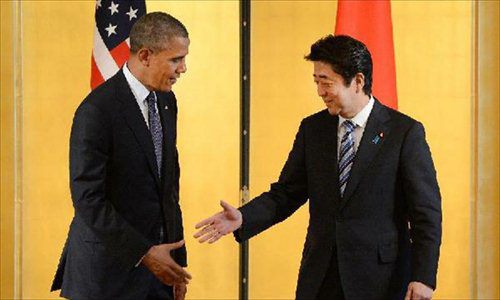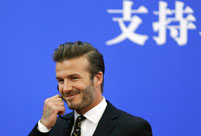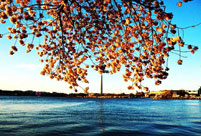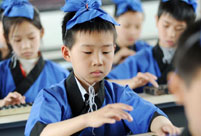 College girls call for protection of ecological space on earth
College girls call for protection of ecological space on earth
 Top 10 celebrities driving auto brands
Top 10 celebrities driving auto brands
 10 low-carbon tips to save money
10 low-carbon tips to save money
 Luxury cars make Asia premiere at Auto China
Luxury cars make Asia premiere at Auto China
 Versatile dog
Versatile dog
 Ni Ni covers BAZAAR JEWELRY
Ni Ni covers BAZAAR JEWELRY
 Cherry blossoms reach peak bloom in Washington D.C.
Cherry blossoms reach peak bloom in Washington D.C.
 Top Chinese fashion icons in foreigners' eyes
Top Chinese fashion icons in foreigners' eyes
 Asia's largest business aviation exhibition to be held in Shanghai
Asia's largest business aviation exhibition to be held in Shanghai
 World's top-rated luxury hotels
World's top-rated luxury hotels
 |
| US President Barack Obama (L) shakes hands with Japanese Prime Minister Shinzo Abe (R) at the Akasaka guesthouse in Tokyo on April 24, 2014. Visiting US President Barack Obama and Japanese Prime Minister Shinzo Abe on Thursday vowed to enhance bilateral ties and agree to continue their talks on the US-led Trans-Pacific Partnership (TPP) free trade talks. (Xinhua) |
US President Barack Obama Thursday characterized North Korea's behavior as provocative and irresponsible, adding that China's influence on the nation could be critical.
Analysts said that China faces a "dilemma" in stopping North Korea's nuclear programs and warned that there could be greater risks if the US pushes Pyongyang too much.
"North Korea has engaged in provocative actions for the last several decades. It's been an irresponsible actor on the international stage for the last several decades," Obama said at a joint press conference with Japanese Prime Minister Shinzo Abe, a day ahead of his visit to Seoul.
Calling North Korea the most destabilizing factor in the Asia-Pacific region, Obama said North Korean leaders must change their behavior if they are serious about being a normal nation.
Obama said by working with Japan, South Korea and China, the US will work to keep pressing North Korea so that "at some junction, they end up taking a different course."
"China's participation in pushing the DPRK in a different direction is critically important," he added.
While the passive North Korean policy of the Obama administration has not been efficient and has its limits, Washington wants Beijing to push Pyongyang on issues like nuclear weapons, said Yang Moo-jin, a professor of the University of North Korean Studies in Seoul.
"But China is currently in a dilemma in dealing with North Korea," said Jin Qiangyi, director of the Asia Studies Center at Yanbian University in Jilin Province.
China has limited influence on North Korea in terms of its nuclear program. While Beijing has to rein in Pyongyang for its own safety and reputation, pushing Pyongyang too hard may bring a huge risk - the collapse of North Korea, Jin said.
Chinese foreign ministry spokesman Qin Gang said Thursday that China is steadfast in realizing the denuclearization of the Korean Peninsula and called for all parties to decrease tensions and work with China.
In the run up to Obama's visit, South Korea's defense ministry warned that the North may carry out a fourth nuclear test at any time, citing heightened activity at the Punggye-ri nuclear test site.
South Korean government also said that the North has placed a detonator, fissile material and measurement devices in a tunnel at its nuclear test site and has sealed it.
"A fourth nuclear test will likely bring China and the US together," Jin said, adding that China and the US have not had in-depth exchanges on the North Korean issue in recent years, due to different strategic considerations.
Obama is scheduled to fly to Seoul Friday to hold talks with South Korean President Park Geun-hye. He is due to leave Saturday night for Malaysia.
"They will discuss nuclear issues and strengthening bilateral ties, but it's unlikely that they will make any bold statements such as on human rights issues," Yang said, adding that depression brought to South Koreans by the ferry disaster could also play down other agenda.
The Korean ferry Sewol sunk on April 16. So far 175 have been confirmed dead, and 127 are still missing.
Jin said that Obama may make promises to Park about the North Korean issue to pull South Korea closer to the US and away from China.
Obama's trip also includes a visit to the War Memorial of Korea, a meeting with business leaders and a visit to the Combined Forces Command at the headquarters in Seoul, Yonhap News Agency reported.
 4th Beijing Int'l Film Festival ends
4th Beijing Int'l Film Festival ends Commando elite specializes in sign language
Commando elite specializes in sign language Man photoshops himself into girlfriend's childhood photos
Man photoshops himself into girlfriend's childhood photos Photo story: Stallholders at Beijing Zoo Wholesale Market
Photo story: Stallholders at Beijing Zoo Wholesale Market Artists on backstage
Artists on backstage Beckham launches fund to support youth soccer in China
Beckham launches fund to support youth soccer in China Cherry blossoms hit peak bloom in Washington D.C.
Cherry blossoms hit peak bloom in Washington D.C. Children in ancient costumes learn Zhusuan
Children in ancient costumes learn Zhusuan Tens of thousands celebrate Water Splashing Festival
Tens of thousands celebrate Water Splashing Festival Giant panda Sijia is back to happy life
Giant panda Sijia is back to happy life Richest Chinese of 2014: half from the mainland
Richest Chinese of 2014: half from the mainland Chengdu - laid-back lifestyle makes happiest city
Chengdu - laid-back lifestyle makes happiest city The backstage of the Fashion Week
The backstage of the Fashion Week College students in Han costumes
College students in Han costumes Postgraduate works as waitress
Postgraduate works as waitressDay|Week|Month